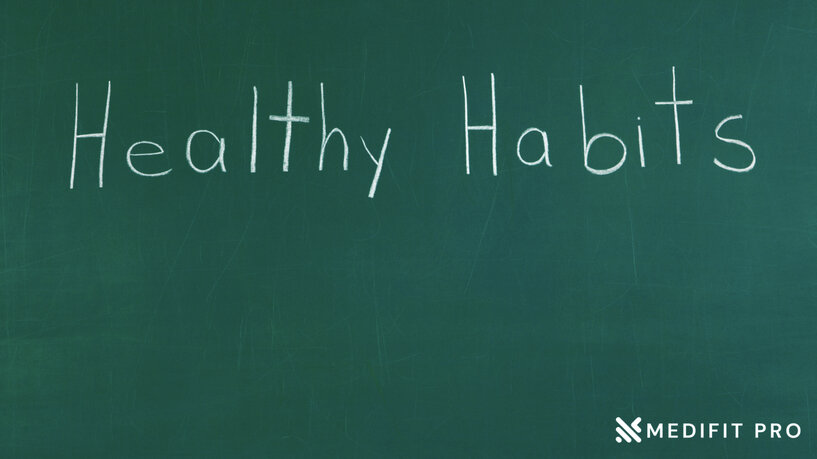In your 20’s, you may feel like you have your whole life ahead of you and that there’s plenty of time to develop healthy habits later on. However, developing healthy habits now can set you up for a happier and healthier future. In fact, studies have shown that many of the chronic health conditions that people face later in life, such as heart disease and diabetes, can often be prevented or delayed by adopting healthy habits in your 20’s.
In this article, we’ll explore 20 (actually more than 20) healthy habits that women in their 20’s can develop to improve their physical, mental, and emotional well-being. From exercise and nutrition to self-care and personal development, these habits can help you lead a more fulfilling and healthy life.
II. Habits related to physical health
A. Exercise regularly
Regular exercise is essential for maintaining a healthy body weight, reducing your risk of chronic diseases, and improving your mental health. It’s recommended that adults get at least 150 minutes of moderate-intensity exercise each week. This can include activities like brisk walking, cycling, or swimming. Also read How to Stay Motivated for Exercise
B. Practice good sleep habits
Getting enough sleep is essential for both physical and mental health. Aim for 7-9 hours of sleep per night and try to maintain a consistent sleep schedule. Avoid electronics before bed and create a relaxing sleep environment. For tips , read Sweet Dreams: Tips for better Sleep
C. Drink plenty of water
Drinking enough water is crucial for maintaining good physical health. Aim for at least eight glasses of water per day, and consider carrying a reusable water bottle with you to help you stay hydrated throughout the day.
D. Eat a balanced and nutritious diet
Eating a balanced and nutritious diet can help you maintain a healthy weight, reduce your risk of chronic diseases, and improve your energy levels. Focus on eating plenty of fruits, vegetables, whole grains, and lean protein, and limit your intake of processed and high-fat foods.
E. Practice safe sex
Practicing safe sex is essential for protecting yourself from sexually transmitted infections and unplanned pregnancy. Use condoms or other forms of birth control consistently and get regular screenings for STIs.
F. Get regular check-ups and preventative screenings
Regular check-ups and preventative screenings can help you catch potential health issues early on and take steps to prevent them from becoming more serious. Make sure to schedule regular appointments with your healthcare provider and get recommended screenings for things like breast cancer, cervical cancer, and cholesterol levels.
G. Avoid smoking and excessive alcohol consumption
Smoking and excessive alcohol consumption can have a negative impact on your physical health, increasing your risk of heart disease, cancer, and other health problems. If you currently smoke or drink excessively, consider seeking help to quit or cut back.
H. Take breaks from technology
Spending too much time on electronic devices can have negative effects on your physical health, including eye strain, poor posture, and disrupted sleep. Try to take regular breaks from technology and engage in other activities like exercise or spending time outdoors.
I. Practice good hygiene habits
Good hygiene habits, such as washing your hands regularly, can help prevent the spread of germs and illness. Make sure to also practice good dental hygiene by brushing and flossing regularly.
J. Manage your stress levels
Chronic stress can have a negative impact on your physical health, increasing your risk of heart disease, obesity, and other health problems. Find healthy ways to manage your stress levels, such as exercise, mindfulness, or spending time with loved ones.
K. Get outside and get active
Spending time outdoors and engaging in physical activity can have numerous health benefits, including reducing stress, improving mood, and boosting your immune system. Try to spend time outside and get active on a regular basis, whether it’s going for a walk, a bike ride, or a hike.
L. Maintain a healthy work-life balance
Maintaining a healthy work-life balance can help reduce stress and improve your physical health. Make sure to take time for yourself outside of work, and don’t be afraid to set boundaries and prioritize your own well-being.
III. Habits related to mental health
A. Practice mindfulness and stress management
Practicing mindfulness and stress management techniques like meditation, yoga, or deep breathing can help you manage stress and improve your mental health.
B. Cultivate meaningful relationships
Maintaining strong relationships with friends, family, and romantic partners can improve your mental health and help you feel more fulfilled in life.
C. Prioritise self-care and self-love
Taking time for yourself and practicing self-care can help you maintain good mental health and reduce stress. This can include things like taking a relaxing bath, getting a massage, or practicing a hobby you enjoy.
D. Practice gratitude
Focusing on the things in your life that you’re grateful for can help you maintain a positive outlook and improve your mental health. Consider starting a gratitude journal where you write down things you’re thankful for each day.
E. Seek professional help when needed
If you’re struggling with your mental health, don’t be afraid to seek professional help. This can include therapy, counseling, or medication if needed.
F. Set goals and work towards them
Setting goals can help provide a sense of purpose and direction, which can have a positive impact on your mental health. Make sure to set realistic and achievable goals, and celebrate your accomplishments along the way.
G. Practice self-reflection and introspection
Take time to reflect on your thoughts, feelings, and behaviors, and consider how they may be impacting your mental health. Engage in introspection and self-exploration, such as journaling or therapy, to gain a better understanding of yourself and your emotions.
H. Practice healthy coping mechanisms
When faced with stress or difficult emotions, it can be tempting to engage in unhealthy coping mechanisms, such as substance abuse or overeating. Instead, try to develop healthy coping mechanisms, such as exercise, meditation, or creative expression.
I. Prioritise sleep and rest
Getting enough rest and sleep is crucial for maintaining good mental health. Make sure to prioritize sleep and rest, and don’t hesitate to take a break or say no to commitments when you need to.
J. Engage in activities you enjoy
Engaging in activities you enjoy, whether it’s a hobby or spending time with friends, can have a positive impact on your mental health. Make sure to carve out time for these activities and prioritize your own enjoyment and pleasure.
Incorporating these healthy habits related to mental health into your routine in your 20’s can help you develop resilience, manage stress, and cultivate a sense of well-being that will serve you well in the years to come.
IV. Habits related to personal growth and development
A. Read regularly
Reading regularly can have numerous benefits for personal growth and development, including expanding your knowledge, improving your vocabulary, and enhancing your critical thinking skills. Try to make reading a regular part of your routine, whether it’s fiction or non-fiction.
B. Learn a new skill or hobby
Learning a new skill or hobby can help you develop new interests and passions, and can also have practical benefits, such as improving your career prospects or enhancing your personal relationships. Consider taking a class, joining a club, or learning a new skill online.
C. Set goals and work towards them
Setting goals can help provide a sense of direction and purpose, and can also help you develop important skills such as time management and discipline. Make sure to set realistic and achievable goals, and take steps towards achieving them on a regular basis.
D. Practice financial responsibility
Developing good financial habits in your 20’s can set you up for financial success in the future. Make sure to create a budget, save regularly, and avoid unnecessary debt. Consider meeting with a financial advisor to help you develop a plan for your financial future.
E. Travel and explore new places
Traveling and exploring new places can broaden your perspective, enhance your creativity, and provide opportunities for personal growth and development. Even if you can’t travel far, try to explore new places in your local area and make a habit of seeking out new experiences.
F. Volunteer and give back to the community
Volunteering and giving back to the community can have numerous benefits, including enhancing your sense of purpose, improving your social connections, and providing opportunities for personal growth and development. Consider volunteering at a local organization or donating to a cause you care about.
V. Habits related to career and professional development
A. Network and build connections
Networking and building connections in your industry can help you discover new opportunities, learn from others, and build relationships that can be valuable throughout your career. Attend industry events, join professional organizations, and make an effort to connect with others in your field.
B. Continuously learn and develop new skills
In today’s rapidly changing job market, it’s important to continuously learn and develop new skills to stay competitive. Consider taking courses or attending workshops to enhance your skills and knowledge in your field.
C. Set professional goals and work towards them
Setting professional goals can help provide a sense of direction and purpose in your career, and can also help you develop important skills such as time management and organization. Make sure to set realistic and achievable goals, and take steps towards achieving them on a regular basis.
D. Prioritise work-life balance
Maintaining a healthy work-life balance is essential for both your personal well-being and your professional success. Make sure to take breaks when needed, set boundaries between work and personal time, and prioritize activities outside of work that bring you joy and fulfillment.
Conclusion
As we wrap up our discussion on the 20 healthy habits to develop in your 20s for women, it’s important to remember that these habits can have a profound impact on your overall health and well-being. By prioritizing your physical health, mental health, personal growth and development, and career and professional development, you can set yourself up for success in all aspects of your life.
Developing healthy habits in your 20s can also have long-lasting benefits, helping you maintain a healthy and fulfilling life well into your later years. Whether it’s incorporating regular exercise, practicing mindfulness and stress management, or setting professional goals and building connections, every small habit can make a big difference.
So, let’s commit to developing these healthy habits and living our best lives in our 20s and beyond. Remember to prioritize your overall well-being, take care of yourself, and never stop learning and growing. Here’s to a happy, healthy, and fulfilling life ahead!
Reference
20 Healthy Habits Every Woman Should Have in Her 20s” by Shape: https://www.shape.com/lifestyle/mind-and-body/20-healthy-habits-every-woman-should-have-her-20s





























Recent Comments